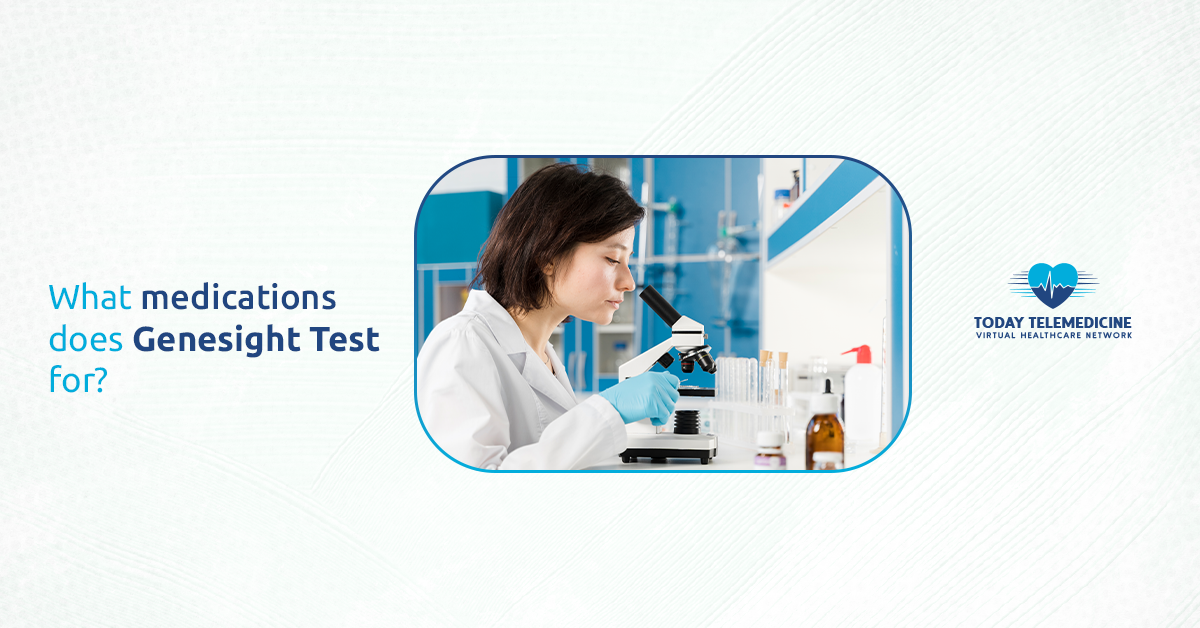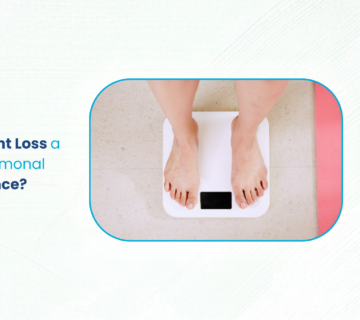GeneSight testing is a new medical tool. It offers personal insights into how your DNA affects your reaction to some medications.
Doctors in the United States often use this test. They use it to decide on mental health treatments.
Let’s explore “What medications does GeneSight test for?” We’ll see how it works and why it matters.
Today Telemedicine offers personal mental wellness solutions. Our GeneSight Testing finds the right medications for you based on your genes. It leads to better health. Contact us for more information.
What Is a GeneSight Test?
A GeneSight test is a DNA examination. It shows how your genes might affect your reaction to some drugs.
These are primarily for addressing psychological health concerns, like depression, anxiety, and ADHD. The trial makes use of a basic saliva swab.
It checks for gene variations that affect how your body metabolizes medications. Doctors use personalized genetic data to choose medications. This method increases treatment success and reduces side effects.
How Does GeneSight Testing Work?
GeneSight screening is direct and low impact. Here’s a point-by-point analysis of the procedure:
- Sample Collection: Your healthcare provider quickly swabs your cheek to gather DNA.
- Lab Analysis: GeneSight’s lab tests the sample for important genetic markers. It analyzes the DNA for specific indicators. This process reveals vital genetic information, guiding treatment decisions.
- Results Generation: Your doctor will soon get a report just for you. It shows which drugs might work best based on your genes. The report also warns against certain medications.
Benefits of GeneSight Testing
GeneSight reshapes mental health treatment through genetic analysis. By tracing your DNA, it:
- Pinpoints ideal medications
- Minimizes side effects
- Reduces guesswork
This personalized approach accelerates relief and boosts patient confidence. Evidence-based recommendations guide doctors, ensuring more effective and specific treatment plans.
GeneSight-guided treatment improves mental health symptoms 70% more than traditional methods.
What Medications Does GeneSight Test For?
GeneSight tests a variety of medications, especially for mental health and related disorders. It checks how your body handles these drugs. This ensures you get the best prescriptions.
Medications for Mental Health
GeneSight primarily focuses on mental health treatments. It includes:
- Antidepressants
- Anxiolytics
- Antipsychotics
GeneSight shows which medications work best for your genes. This way, doctors try fewer drugs to see what helps. This approach probably saves time and stress in mental health treatments.
GeneSight Testing for ADHD
GeneSight tests are popular for managing ADHD medicines. It finds which drugs could work best for someone with ADHD. This depends on their genetics.
Common medications include:
- Methylphenidate
- Amphetamines
- Atomoxetine
Using GeneSight testing can guide you in finding the right medication for better management of ADHD.
Antidepressants and GeneSight
If depression troubles you, GeneSight assists doctors in selecting the right medicine. This test matches the best drug with your genes.
Types of Antidepressants
GeneSight chooses from different antidepressants, like
- SSRIs (Selective Serotonin Reuptake Inhibitors)
- SNRIs (Serotonin-Norepinephrine Reuptake Inhibitors)
- Tricyclic antidepressants
GeneSight leads to better depression treatments. Better outcomes are important.
Pain Management Medications
Chronic pain sufferers might find GeneSight testing helpful. This genetic test shows how people process opioids and painkillers. It can prevent bad reactions and useless treatments. By looking at specific genes, GeneSight customizes pain management to each person’s biology.
Sleep Medications
GeneSight’s genetic test customizes sedatives and sleep meds for each patient. This method improves insomnia and sleep disorder treatments. It matches medications to the body’s natural processes for best results.
How to Interpret the GeneSight Report?
Many patients find the GeneSight report confusing. While it provides valuable information, it can be complex without a medical background.
The GeneSight report uses color-coded categories. These categories show how medications probably work for you based on your genes. The colors indicate how likely a medication works. They indicate dose changes or side effects.
The three categories:
- Use as Directed
- Moderate Gene-Drug Interaction
- Significant Gene-Drug Interaction
These categories provide a quick overview, but there’s more to understand.
Understanding Medication Categories
- Green (Use as Directed): A green light means you can start the medication. Yet, consider drug and food interactions, allergies, and other factors.
- Yellow (Moderate Gene-Drug Interaction): This is like a caution sign. Your doctor should be careful and may need to adjust the dose or monitor you closely.
- Red (Significant Gene-Drug Interaction): A red light means your doctor needs to exercise extreme caution. They must review everything carefully, and sometimes it’s still safe to proceed, but with careful consideration.
Understanding these categories helps you and your doctor make informed medication choices.
How Long Does It Take to Get GeneSight Results?
Patients commonly ask, “How long does it take to get GeneSight results?” GeneSight results usually arrive in about 2 days once the lab collects the sample.
The process starts when the sample, often taken by a cheek swab or blood draw, reaches the GeneSight lab. The lab analyzes the sample.
Results are compiled into a report. These GeneSight results are uploaded to the GeneSight login portal, where patients and doctors can access them. The healthcare provider reviews the findings with the patient.
They discuss how genetic factors could affect medication choices for mental health treatments. These results may help in decision-making.
Is GeneSight Covered by Insurance?
One common question is, Is GeneSight covered by insurance? Insurance coverage for GeneSight testing varies widely.
Medicare and some private insurers may cover it if deemed necessary. This usually applies to patients with depression or similar conditions needing medication.
However, coverage isn’t guaranteed. So, it’s crucial to check with your insurer about your plan.
For those without coverage, GeneSight offers financial assistance. Always explore your options before the test.
Is GeneSight Legitimate and FDA Approved?
Many people wonder if GeneSight is legitimate. The answer is yes. Research proves that GeneSight is effective and widely used by United States healthcare providers.
Although it’s not FDA-approved, it meets strict CLIA lab standards. Thousands trust this genetic test to make informed treatment decisions in clinics.
Conclusion
In summary, what medications does GeneSight test for? GeneSight tests for a selection of treatments, like antidepressants and mood stabilizers.
It gives personalized insights into ADHD, psychosis, and mood disorders. It’s vital for customizing treatments.
Its reliability and thoroughness have made GeneSight a preferred choice for personalized care.
To find the right medication, talk to Today Telemedicine’s doctor about GeneSight. It’s a test that removes the guesswork from treatment.
FAQs
Is GeneSight covered by insurance?
Before testing, check with your insurance provider for coverage. Policies differ greatly among insurers.
Can GeneSight help with ADHD treatment?
Yes, Your DNA is crucial for ADHD treatment success. GeneSight identifies medications that match your genetic profile.
What medications does GeneSight test for?
GeneSight tests how people respond to drugs for mental health, ADHD, pain, and sleep. It also helps doctors choose the right medications in these areas.
Is genesight FDA approved?
GeneSight isn’t FDA-approved for diagnosis, but it meets key genetic testing standards. This lab test follows regulations for personalized medicine and aligns with FDA guidelines.





